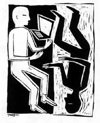| The Digital Divide | |||||
|
Not everyone can afford to buy computers or have access to the Internet so
they can take advantage of the benefits that ICT systems can provide.
There may be social or economic reasons for this, or it may be a skills problem. The difference between people who have computers with access to the Internet and can use them.... and those who do not... is called the digital divide. The digital divide is concerned with..
There is a digital divide within a country, but there is also a digital divide between countries. Weblink
(a 2001 Becta report):
|
 |
||||
|
People who..
|
THE |
People who...
|
|||
|
People generally...
|
People generally...
|
||||
|
"The revolution in computers and telecommunications networks and the accelerated rate of this change, along with the global explosion in knowledge, are creating unprecedented changes in the flow of trade, finance, and information in and among nations. New jobs, an explosion in entrepreneurship, access to education, new modes of community building, ease of access to global markets-all of these things, and many more, are dividends of this revolution in information technology. Yet the fruits of the Information Age are out of reach for many in both developed and developing nations. This gap, the "digital divide", threatens to cut off populations from good jobs and the chance to participate in the affairs of the broader society. For some citizens technology brings the promise of inclusion, opportunity and wealth; for others, greater isolation and increased poverty." |
|||||

